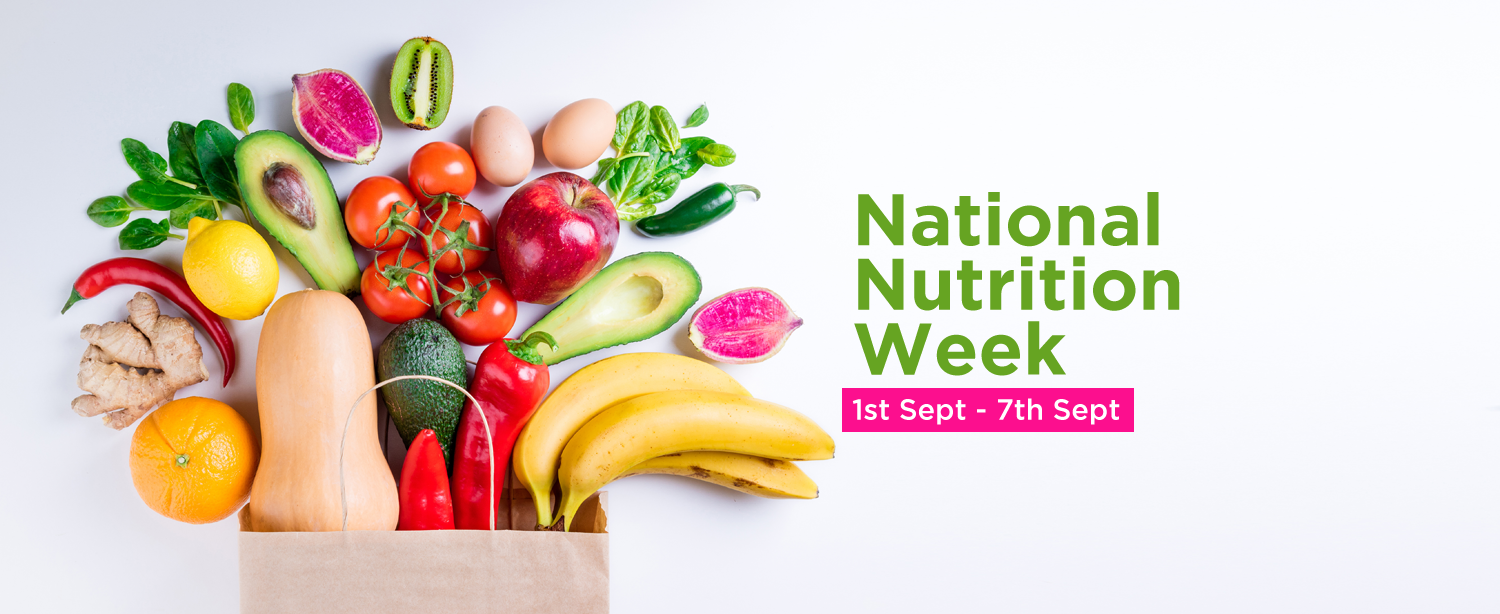Nutrition Matters
Every year, from the 1st to the 7th of September, India celebrates National Nutrition Week to raise awareness about the importance of good nutrition and health. Eating healthy foods and exercising on a regular basis will help you live a longer and healthier life. A nutritious diet promotes a healthy pregnancy, supports normal growth, development, and aging, aids in body weight maintenance, and lowers the risk of chronic disease. For a healthy mind and healthy body, it is essential to eat a balanced diet with high nutrition.
Benefits of Good Nutrition
Healthy food starts with a healthy diet in pregnancy, continues with breast milk for babies, and is important for children, teenagers, adults as well seniors. Here is how a healthy diet helps your body:
- Strengthens your immunity
- Improves mood
- Provides energy
- Maintains a healthy body weight
- Helps you live longer
- Reduces your risk of chronic diseases
- Reduces risk of mental disorders
Nutrition and children
The theme of the 2021 National Nutrition Week is “feeding smart right from start”. If you learn healthy eating habits as a child, they are more likely to stay with you. That’s why it’s important that you teach your children healthy eating habits from a young age. Here are some healthy eating suggestions to consider:
- Be a role model
- Offer a variety of healthy food choices
- Make mealtimes a priority
- Avoid force-feeding
- Skip the food reward
- Put limits on screen time
- Set snack boundaries
A Balanced Diet
Did you know? 9 out of 10 people suffer from a protein deficiency. This could be due to the increasing consumption of convenience foods that are high in carbs and sugars and low in protein or due to lack of awareness. It is essential to eat the right type and amount of foods to support a healthy lifestyle. Always remember deprivation is not the solution, creating a balance is. A well-balanced diet focuses on giving your body all of the nutrients it needs. It contains macronutrients such as protein, carbs, and fat, as well as micronutrients such as vitamins and minerals. These nutrients come from a variety of sources, including fruits and vegetables, cereals and pulses, meat and dairy products, as well as fats and oils. Here are some important foods to have:
- Carbohydrates
Carbohydrates are your body’s main source of energy. In India, 70-80% of total dietary calories are derived from carbohydrates present in plant foods such as cereals, millets, and pulses. - Proteins
About 30 to 35% of your diet should consist of protein. This could be in the form of pulses, milk, leafy greens, eggs, paneer, lentils, meat or sprouts. - Fats
Fats provide energy, store vitamins, and synthesize hormones. About 1/5th of your diet should be devoted to fats all three kinds -polyunsaturated, monosaturated and omega-3 fatty acids. - Vitamins and Minerals
These micronutrients support metabolism, nerve and muscle function, bone maintenance, and cell production. Minerals are inorganic and so minerals from plants, meat, and fish easily find their way into the body. They can be derived from nuts, oilseeds, fruits, and green leafy vegetables.
Prioritize Your Meals
To keep your body running smoothly, you require three main meals coupled with healthy snacking to curb unnecessary cravings. Here is what an ideal diet should consist of:
- Breakfast
A good morning meal should comprise of three things. These are dietary fiber or carbohydrates (whole-grain bread, paratha, oatmeal), proteins (eggs and egg whites, yoghurt, milk, and sprouts) and nuts (almonds, walnuts, figs). This way you’ll eat fewer calories the rest of the day. - Lunch
Make it a mix of high-fibre whole grains like brown rice, barley, or jowar, starchy carbs, and some good source of proteins like cottage cheese, pulses, lentils chicken, or fish. Include some probiotics like yogurt or buttermilk and fibre from fresh salads. - Dinner
To maintain a healthy balanced diet, choose your dinner with a high satiety value, which will keep you fuller for longer and help you avoid midnight binges. Fill your plate with a variety of vegetables to load up on vitamins and minerals. Limit carbs but don’t eliminate them completely.
Don’t give up on snacking: Choose to snack healthy and substitute your fried snacks and chips with roasted snacks, fresh fruits, nuts or dips.
Disease Prevention
Eating healthy foods, getting adequate exercise, and refraining from tobacco and excessive alcohol use has positive effects on your health. Healthy eating can help lower your risk of certain medical conditions such as heart disease, stroke, obesity, hypertension, diabetes, and various types of cancers.
Nutrition care at Kokilaben Dhirubhai Ambani Hospital
Looking for personalized dietary solutions to feel healthier? We offer holistic and individualized care to patients and help transform lives with a healthy diet plan. Meet highly trained and experienced dieticians from our Department of Nutrition Therapy for further guidance. Please find below the link for further details: https://www.kokilabenhospital.com/departments/clinicaldepartments/nutritiontherapy.html


